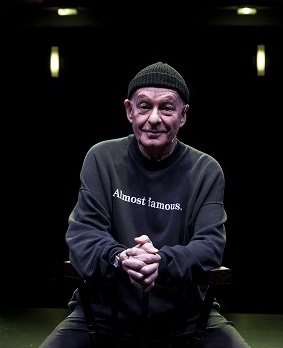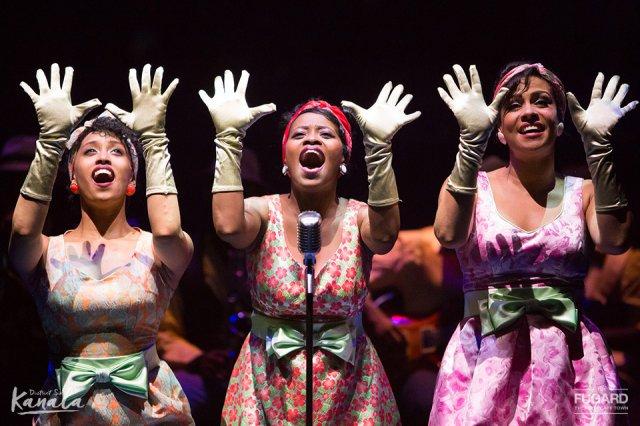Just 22 years old, South Africa’s national “Day of Reconciliation” on 16 December has shuffled into its perplexed young adulthood. Although commemorative events abound, few people seem to know how to strike the right note for this (just) pre-Christmas holiday. It symbolically occupies a date dear both to Afrikaners - victory over the Zulu kingdom at the Battle of Blood River in 1838 - and to their erstwhile victims. On 16 December 1910, Africans protested against their disenfranchisement, while on the same day in 1961 the armed wing of the ANC - Umkhonto we Sizwe - came into being.
One group that has grasped the opportunity with both hands (and many feet) is the Handspring Trust. The community offshoot of Handspring Puppet Company, the Cape Town puppeteers who made War Horse a global smash, the trust stages a joyful, unifying parade every year through the streets of Barrydale, a farming town in the Eastern Cape much in need of uplift. This year’s carnival happens on Sunday 18 December. Handspring’s genius puppet-maker Adrian Kohler has crafted five magnificent elephants for Olifantland: both a celebration of the great beasts themselves, and a platform on which to explore all those “difficult narratives of land, heritage and history”.
Like Liverpool, this dockside patch of Cape Town quickly absorbed every style that the ships and their sailors could unload
South Africans can hardly escape those “difficult narratives” just now, with embattled president Jacob Zuma fending off attacks not only from the courts and the media but large sections of the ruling ANC itself, as allegations of cronyism and corruption swell to Table Mountain proportions. Meanwhile, the militants of the Economic Freedom Fighters and the “Fallist” movement - the radical protest front spawned from the campus-based Fees Must Fall and Rhodes Must Fall campaigns - remind us of how little has changed for millions of citizens over those 22 years of (qualified) freedom. Perhaps it should hardly come as a surprise that, while the sun shines and the beaches beckon, Cape Town’s summer entertainment shows an inclination to look back to times of clearer issues, grander causes and more heroic battles. In any case, whatever the health of the body politic, the season delivers its own feelgood factor. Apocalyptic fears melt away when the sound of Christmas carols drifts at sunset over the paradisal slopes of Kirstenbosch Gardens.
Back in the city centre, on the still-scrappy edge of the neighbourhood the show recreates, the Fugard Theatre has revived its production of District Six: Kanala. In 1986, with the apartheid regime nearing its terminal crisis, David Kramer and his late collaborator Taliep Petersen created the original District Six musical as a tribute to the multi-racial - but mostly “Coloured” - inner-city tract bulldozed by the state after it was declared a “white” area in 1966. Kramer and Pietersen’s tuneful and exuberant homage to this legendary melting-pot toured the world (Edinburgh included) and bred later musicals such as Kat and the Kings - which won two Olivier Awards in the West End.
At the Fugard, the latest edition of this franchise retains the upbeat, vaudeville format. Maybe with younger spectators in mind, it inserts the device of a girl raised in Cape Flats - the often bleak expanse of townships where District Six residents were dumped after their expulsion - who quizzes her granny for memories of this smashed happiness and leafs through old photographs. Cleverly back-projected or wrapped around the action, these images of a sometimes rough but dynamic and diverse neighbourhood temper the Broadway-style pizzazz of the song-and-dance numbers with haunting fragments of actual history. Anray Amansure touches and convinces as the girl in search of a vanished multi-cultural magic, while among the rest of a company who basically belt out one retro favourite after another, Edith Plaatjies, Loukmaan Adams and Carmen Maarman manage to act as well.
 Like Liverpool, this dockside patch of Cape Town quickly absorbed every style that the ships and their sailors could unload. From the Cape “minstrels” of the 19th century onwards, musicians and performers customised imported sounds with local spice. Although the (first-rate) backing band sometimes slips off in the direction of cool Cape jazz, in the manner of Abdullah Ibrahim, for the most part the show delights its punters with songs and dances that reflect the headline genres of its time-span. That runs from the 1940s to the mid-1960s; roughly, in a production where girl groups shine, the period bookended by the Andrews Sisters and The Supremes. Anyone who imagines that a proper African musical should sound like The Lion King will be in for a rude shock - but, arguably, it’s much more “authentic” than that.
Like Liverpool, this dockside patch of Cape Town quickly absorbed every style that the ships and their sailors could unload. From the Cape “minstrels” of the 19th century onwards, musicians and performers customised imported sounds with local spice. Although the (first-rate) backing band sometimes slips off in the direction of cool Cape jazz, in the manner of Abdullah Ibrahim, for the most part the show delights its punters with songs and dances that reflect the headline genres of its time-span. That runs from the 1940s to the mid-1960s; roughly, in a production where girl groups shine, the period bookended by the Andrews Sisters and The Supremes. Anyone who imagines that a proper African musical should sound like The Lion King will be in for a rude shock - but, arguably, it’s much more “authentic” than that.
Kramer’s variation on his winning formula delighted an audience that relished every in-joke and ribald outburst of street-corner Afrikaans (any overseas tour might need a few tweaks). And the final blow, as the apartheid fantasy of ethnic purity wrecks the complexity of real lives and loves, still shocks. A short walk from the theatre, much of the former District Six lies vacant: a windswept wilderness that bears witness to barbarism in thrall to a demented ideology.
On the other side of Devil’s Peak, the University of Cape Town’s hulking Baxter Theatre hosts other sorts of period pleasures. On the main concert stage of this pharaonic arts complex in leafy, academic Rondebosch, the much-loved local entertainer Alistair Izobell - also the music director of District Six: Kanala - is presenting his Kaapse Jol (“Cape Christmas”): another show packed with the traditional sounds of the city. In the studio theatre, however, a more muted treat awaits. Pieter-Dirk Uys, fabled apartheid-era satirist and creator of Evita Bezuidenhout, South Africa’s even scarier answer to Dame Edna Everage, has forsaken the slap, wigs and gowns. In a solo performance, The Echo of a Noise, he appears simply as himself (pictured above right).
Unplugged and (as he puts it) “unpowdered”, the 71-year-old gadfly comedian and impersonator explores his family history, his childhood memories, performing career and - not least - his battles with the hilarious stupidity of apartheid censorship. The censors once banned a non-existent word that he had invented. Wearing a sweatshirt with the message “almost famous”, he digs for the roots of Tannie (“Auntie”) Evita in his small-town upbringing with Afrikaner and German ancestry, his family’s troubles - and his youthful obsession with Sophia Loren. Tannie Evita has not retired - she played some gigs here in November. Still, Uys’s more subdued, reflective portrait of the artist movingly locates the origins of the courage and audacity that allowed a wickedly ironic drag-act to get deep under the rhino hide of a sick system.















Add comment